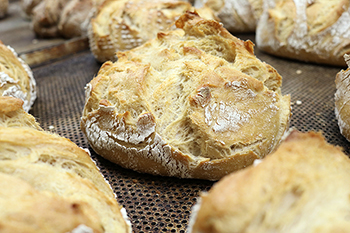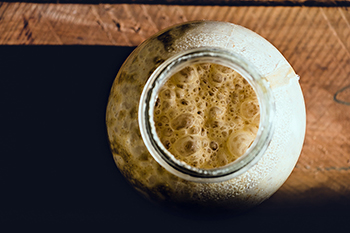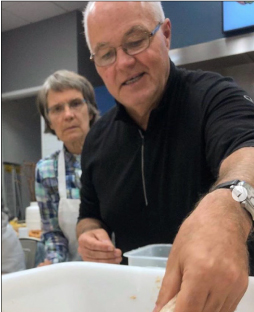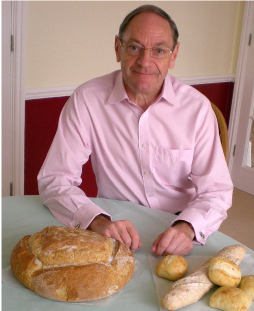|
|
DisplayTitle 3-Part Sourdough Series
Page Content 
Sourdough is a method of breadmaking that requires special fermentation by lactic acid bacteria and wild yeast. It is believed to be the oldest method used to leaven dough and make bread. Both an art and a science, this process requires time. However, it produces bread with: - Extended Shelf-Life
- Superior Nutritional Profile
- Higher Digestibility
- Better Texture
- Unique Flavors and Aromas

Variations in the microflora, fermentation, conditions, types, and ratios of raw materials are responsible for differences in the functionality of the sour and subsequent flavor in the bread. Sourdough technology is commonly based on wheat or rye flours, or a mixture of both. Such breads have distinctive flavors largely arising from the ratio of acetic to lactic acid flavor notes. The manufactured bread is denser with a less aerated structure than many other wheat breads. The concept of modern sourdough technology is still based on the preparation of a 'starter' or 'mother' dough to exploit the principles of spontaneous fermentation.
Our Three Speakers Will Talk us Through:- The science of starter and sourdough bread quality as impacted by grain and flour quality
- Nutrition and health benefits of sourdough bread
- Commercial challenges of sourdough bread making
Who Should Attend this Webinar Series?Cereal chemists, food scientists, nutritionists, researchers, flour millers, bakers, all those interested in baking including home baking!

What are the Biggest Takeaways that Attendees will get from this Webinar Series?- How to Make Your Starter - For Sourdough (No Yeast Required!)
- Easy Steps to Make Your First Sourdough
- Science of the Starter
- Science of the Grain and Flour: Important for Sourdough Bread Quality
The Science of Starter and Sourdough Quality
Broadcast Date: July 2nd, 2020 | 4:00pm CST
View On-Demand Webinar
Bread baked with sourdough has been a traditional baking practice used in European countries for centuries. Now, this practice has gained popularity in many other parts of the world. Sourdough bread is of premium quality and is well-known for its distinct and very pleasing flavour, unique shape, and crispy crust. Italian Altamura bread, French baguette, and European dense rye bread are formulated with flour, water, salt, and sourdough which is used for natural dough fermentation. However, each type of bread is so unique due to the type of flour used, the nature of sourdough, and the way the dough is handled, shaped, and baked. Textural properties and flavour vary depending on bread type. Understanding the basic concepts of sourdough will provide a baker with the tools necessary to create unique bread of exceptional quality. This presentation will cover fundamentals on how to start a sourdough culture, develop it, and use it for bread baking. Baguette baked with liquid levain will be used as an example to explain the formulation and concepts of baking using a natural fermentation process. Flour quality requirements for sourdough bread will be explained as well.

|
Yulia Borsuk is an end products manager at the Canadian International Grains Institute (Cigi), where she is responsible for the activities related to the applicability of Canadian wheat in bread, Asian products, and pasta. This includes testing flour or semolina for functional quality in the final products, delivering practical baking demonstrations and workshops, conducting research and development projects, consulting and baking troubleshooting. Yulia also worked as a production supervisor in an industrialized bakery (Canada Bread Ltd.), where she gained experience in all aspects of commercial bread processing. Yulia is a co-author of a number of papers with a focus on the applicability of pulse flours in bread making. Yulia graduated from the University of Manitoba, Canada with an MSc in Food Science. She took a professional course on the French Breads and Viennoiseries at Ferrandi School, France. Yulia’s biggest passion in life is baking, and the smell of freshly baked rye bread made with sourdough at home is the highlight of her weekend. |
Nutrition and Health Benefits of Sourdough Bread
Broadcast Date: July 9th, 2020 | 4:00pm CST
View On-Demand Webinar
Sourdough fermentation is claimed to be a way of improving the nutritional profile of breads. This webcast is designed to investigate some of these claims. I am an experienced and trained sourdough baker. In my extensive travels through the sourdough world, some questions occur repeatedly. Often the first is the intersection of mineral availability, wholegrains, and phytate. Others include “digestibility”, although that is too nebulous a term and needs to considered with respect to starch, protein, and fiber individually, and as they interact. The topic of digestibility also crosses over into the realms of non-celiac wheat sensitivity, FODMAPs, and fructans. Other sourdough questions relate to glycæmic response, fiber, and the metabolites of the Lactobacilli themselves and their potential health impacts. My intent is to touch lightly on all these topics, and maybe others. As time and questions allow, we may be able to drill down a little more deeply into one or two topics.

|
Professor Andrew Ross is a baker, scientist, and teacher who roams the world encouraging people to eat their whole-grains. He has been a Professor in the Crop and Soil Science Department at Oregon State University for nearly 19 years where he is the quality specialist for the Wheat and Barley Breeding programs. Dr. Ross is also a Professor in the Oregon State Food Science Department where he teaches classes in food chemistry, small grain processing, and food polymer science. For the past 36 years, Andrew has studied and taught about the sciences of baking and cereal-based foods across the globe. Recent teaching events include hands-on workshops on baking science at Marie-Louise’s Køkken in Denmark, and in the USA at Seattle Culinary Academy, the Grain Gathering, the Cascadia Grains Conference, the University of Colorado Grain School, and the Artisan Baking Centre, among others. |
Commercial Challenges of Sourdough Bread Making
Broadcast Date: July 16th, 2020 | 4:00pm CST
View On-Demand Webinar
Process consistency is the key to successful sour dough production. This starts with the starter preparation and continues through dough make-up and baking. Processing conditions need to be modified to deal with the soft and dense nature of sour doughs to deliver acceptable products.

| Cereal scientist, miller and baker,
Stanley Cauvain co-founded the international baking consultancy BakeTran in 2005 which continues to provide technical support, development and training services worldwide. Stan had extensive commercial experience in milling and baking before completing a long and distinguished research career with 10 years as the Director of the Cereals and Cereal Processing Division at Campden & Chorleywood Food Research Association. He has written and co-edited 16 technical books on milling and baking, along with numerous research and technical articles. He was the recipient of the UK British Baker Special Award, the ICC Friedrich Schweitzer medal, an Eberhard Paech award from the German Technical Baking Industry and recently installed as a Freeman of the Worshipful Company of Bakers in the UK.
|
|
